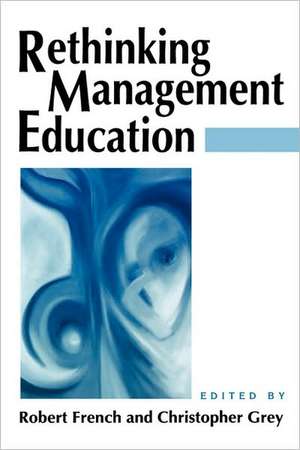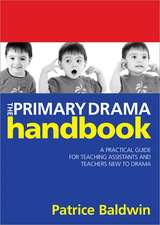Rethinking Management Education
Editat de Robert French, Christopher John Greyen Limba Engleză Paperback – 13 feb 1996
| Toate formatele și edițiile | Preț | Express |
|---|---|---|
| Paperback (1) | 476.74 lei 6-8 săpt. | |
| SAGE Publications – 13 feb 1996 | 476.74 lei 6-8 săpt. | |
| Hardback (1) | 1219.20 lei 6-8 săpt. | |
| SAGE Publications – 21 feb 1996 | 1219.20 lei 6-8 săpt. |
Preț: 476.74 lei
Nou
Puncte Express: 715
Preț estimativ în valută:
91.23€ • 95.68$ • 75.94£
91.23€ • 95.68$ • 75.94£
Carte tipărită la comandă
Livrare economică 01-15 aprilie
Preluare comenzi: 021 569.72.76
Specificații
ISBN-13: 9780803977839
ISBN-10: 0803977832
Pagini: 224
Dimensiuni: 156 x 234 x 12 mm
Greutate: 0.31 kg
Ediția:New.
Editura: SAGE Publications
Colecția Sage Publications Ltd
Locul publicării:London, United Kingdom
ISBN-10: 0803977832
Pagini: 224
Dimensiuni: 156 x 234 x 12 mm
Greutate: 0.31 kg
Ediția:New.
Editura: SAGE Publications
Colecția Sage Publications Ltd
Locul publicării:London, United Kingdom
Recenzii
`The present collection opens up a variety of ways of looking at management education other than the prevailing one, which sees it as a fundamentally utilitarian enterprise charged with the responsibility for producing people who are technically more useful than others at the practice of management. As the opening chapter suggests, the practice of management is itself capable of being viewed from a variety of sociological angles, ranging from functionalism to critical theory, to the sociology of everyday life, to postmodernism. Consequently we cannot take anything for granted about the most appropriate way to look at management education. Instead we are led to several questions: should the accent be on the management or the education, what presumptions about these two concepts should be made explicit, and what bodies of literature might inform this conceptual clarification before we can say that management of education has beeen properly re-thought. The various authors then proceed to draw upon philosophy, from Plato (e.g. Gosling) to Descartes through to Heidegger (e.g. Kallnikos); critical social theory from Habermas to MacIntyre (e.g Roberts); critical education theory from Freire to Giroux (e.g. Cavanaugh and Prasad, Grey, Knights, and Willmott) to Foucault(e.g. Boje). The breadth of critical resources employed is therefore a strength of this collection.... In summary I would say that the book is a welcome and insightful attempt to rethink the matters at stake in management education from one critical perspective' - Management Learning
`Each of the papers in this book is a rich working out of its particular theme, and each relates well to the agenda laid out by the editors in the introduction. The papers are challenging, mostly well written, and address fundamentally important issues for all who are involved in management education. The book lives up to its title, which should also be seen as a warning; academics involved in the field are likely to find themselves challenged on aspects of their own teaching. It might be particularly useful for management departments to take this book and work through it in seminars, and together to engage in "rethinking management education"' - The Occupational Psychologist
`Each of the papers in this book is a rich working out of its particular theme, and each relates well to the agenda laid out by the editors in the introduction. The papers are challenging, mostly well written, and address fundamentally important issues for all who are involved in management education. The book lives up to its title, which should also be seen as a warning; academics involved in the field are likely to find themselves challenged on aspects of their own teaching. It might be particularly useful for management departments to take this book and work through it in seminars, and together to engage in "rethinking management education"' - The Occupational Psychologist
Cuprins
Rethinking Management Education - Christopher Grey and Robert French
An Introduction
Can Management Education be Educational? - Alan B Thomas and Peter D Anthony
Mapping the Intellectual Terrain of Management Education - Jannis Kallinikos
Management Education and the Limits of Technical Rationality - John Roberts
The Conditions and Consequences of Management Practice
Critical Theory and Management Education - J Michael Cavanaugh and Anshuman Prasad
Some Strategies for the Critical Classroom
Is a Critical Pedagogy of Management Possible? - Christopher Grey, David Knights and Hugh Willmott
Experiential Management Education as the Practice of Change - Russ Vince
The MBA - Audrey Collin
The Potential for Students to Find Their Voice in Babel
Plato on the Education of Managers - Jonathan Gosling
Management Education as a Panoptic Cage - David M Boje
An Introduction
Can Management Education be Educational? - Alan B Thomas and Peter D Anthony
Mapping the Intellectual Terrain of Management Education - Jannis Kallinikos
Management Education and the Limits of Technical Rationality - John Roberts
The Conditions and Consequences of Management Practice
Critical Theory and Management Education - J Michael Cavanaugh and Anshuman Prasad
Some Strategies for the Critical Classroom
Is a Critical Pedagogy of Management Possible? - Christopher Grey, David Knights and Hugh Willmott
Experiential Management Education as the Practice of Change - Russ Vince
The MBA - Audrey Collin
The Potential for Students to Find Their Voice in Babel
Plato on the Education of Managers - Jonathan Gosling
Management Education as a Panoptic Cage - David M Boje
Descriere
At a time of ever-increasing debate about orthodox approaches to management education, and their application in the post-industrial era, this innovative book brings together the work of authors actively engaged in developing new forms of education.
The introduction contrasts dominant utilitarian and functionalist conceptions of management education with various alternatives. It argues the need for a critical and pluralistic form of management education whereby participants are introduced to the full diversity of appropriate perspectives and debates. The remainder of the book echoes this commitment by exploring a range of approaches, including those based in psychoanalysis, critical theory and poststructuralism. Throughout t









